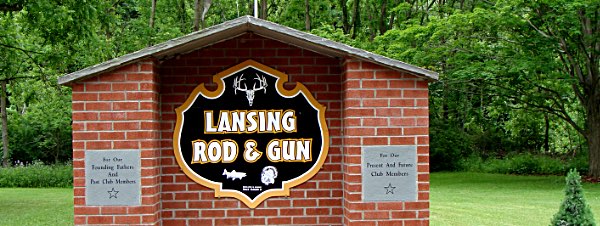- By Dan Veaner
- News
 Print
Print 
The Town of Lansing Planning Board seemed skeptical Monday that a plan to move shooting ranges and periodically clean up lead in and around Salmon Creek at the Lansing Rod and Gun Club will be financially feasible. In response to a US Environmental Protection Agency (EPA) order that would halt the shooting of lead in and around Salmon Creek, the club presented a two-pronged plan that would move shooting ranges across the creek to a more northern location, and hire a company to clean up lead from the area every five years. But Planning Board members feared the cleanup plan is likely beyond the financial means of the club, and other alternatives should be considered.
"Some people want to close the gun club down," said Planning Board member Al Fiorille. "You don't want to do that. If they cease to be in operation my understanding is that it becomes labeled a toxic site. If it's a hazardous site, if you live in Ludlowville and you want to mortgage your property -- if you want to sell it or get a home equity loan or refinance it -- the appraiser has to mention that there is a hazardous site within a half mile of the subject property. That could throw up a red flag and they could deny your application for finance."
Planning Board Chair Tom Ellis said he read of a gun club that closed down after receiving a quote from a lead cleanup company for $2.5 million. He said that among a lot of detailed information the Planning Board wanted to see some quotes from companies that do that kind of work. The Planning Board has also requested a number of items to help their deliberation, including a large, detailed base map; a wetland delineation; ballistics charts showing the range and trajectory of bullets. They calculated that an estimate of 100,000 shots per year equals about two tons of lead.
Homeowners whose house would be closest to the new shooting ranges said they feared their property value and livability of their property would be degraded with a danger of lead poisoning in the soil and well water, and increased noise.
"Does moving this trap range this close to a house warranted?" Ellis asked. "Again, they're not manufacturing anything. They're not hiring anybody. They're not providing any jobs. It's a hobby."
"Those are our three main concerns: property value, our health, and also our safety," said homeowner Lisa Ruzicka. "There are woods up there, and I'm concerned, being that close... bullets flying around ricocheting off trees, landing I don't know where. One of my hobbies is gardening. I grow vegetables. I've done this for years. I will have to give up my hobby so that they can have theirs, because I'm not going to be growing vegetables if lead is in the air."
NYS Department of Environmental Conservation (DEC) Environmental Analyst Terry Phelps also weighed in with a March 22 letter to Lansing Planning Consultant Michael Long. Phelps outlined seven points of consideration, including state permitting that may be required, involving the Army Corps of Engineers for possible permits related to the wetlands on the property, endangered species, and a possible Stormwater Pollution Prevention Plan (SWPPP). Long said he has invited representatives from both the EPA and DEC to attend an upcoming Planning Board meeting, but none had committed to coming.
Attorney Guy Krogh said that the Planning Board does not have the authority to require lead cleanup, but said the Board could suggest alternatives to moving the ranges. He added that the Town would likely need to engage an environmental engineer to evaluate the project, and expressed concern that the plan would be too expensive for the club.
"When people are talking to you as a planning board or later to the Town Board and demanding a cleanup, you don't have that kind of equity jurisdiction," Krogh said. "It's not within the authority of the Planning Board to order somebody to clean it up, not when it comes to this type of substance. You can put conditions on your approval, and if those conditions aren't met then the use for the approval may lapse. But you don't have the enforcement authority to force the environmental cleanup of a site. That's State authority."
"We came to the conclusion that this was becoming very complicated and, ergo, very expensive," Ellis said. "I wouldn't project what the cost would be, but it gets expensive if you get very far in the EIS (Environmental Impact Statement) and the Town hires an environmental engineer to look at all this information. We decided to get back together with the gun club and steer them to a better solution."
Town Councilman Doug Dake said that switching from lead to steel shot would be a much less expensive solution than moving the ranges.
"The easy solution here is pretty obvious," he said. "It seems like that's the obvious way to go. We need to think about the liability of the Town, too. If the gun club goes under who is going to take over that cleanup. To go across the bridge makes no sense, especially if they didn't talk to the homeowners."
But Planning Board member Larry Sharpsteen warned that even steel shot may not be as simple a solution as it appears.
"The corrosion of the steel makes chemical changes to the soil that could make the lead pollution worse," he warned. "The most obvious solution would be to leave them where they are and using shot curtains to limit any future spread."
Consideration of the plan is ongoing. The next Planning Board meeting is scheduled for April 9th.
v14i12



